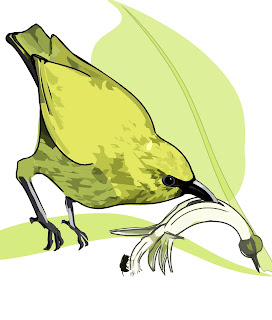Delissea waianaeensis
flower with nectar
larceny by Oʻahu ʻamakihi
(Chlorodrepanis flava)
and contacting pollen by yellow-faced
bees (Hylaeus
sp.).
Human activities can cause changes to the composition of species that
occupy an ecosystem. For instance, species can be lost to a system by
extinction or gained through introduction by humans. Pollination is critical
for ecosystem functioning, and the reshuffling of species communities can
affect pollination processes. Introduced (non-native) animals may interact with
native flowering plants, with the potential to pollinate or steal nectar
(larceny) from flowers without pollination.
In the Hawaiian Islands, many native plants have lost their original pollinators, including nectar-feeding birds. In modern forests, native and non-native birds and insects are known to visit native plant flowers, but it is unclear whether they pollinate or steal nectar, whether native and non-native species differ in their interactions with flowers, and what influences visitation to flowers. On Oʻahu, we deployed camera traps and conducted in-person observations on four at-risk species of Hawaiian lobelioids (Campanulaceae).
We observed birds, mammals, and insects visiting flowers, with a native bird and native bee visiting most frequently. Regardless of whether or not the animals were native or non-native, bees made contact with reproductive structures during most visits (90.5% of visits), while birds stole nectar during most visits (99.3% of visits). Bee and bird visitation increased with the number of flowers on observed plants. Bird visitation also increased with the amount of canopy cover above plants and the number of nearby flowers of the same species in the surrounding plant neighborhood. Additionally, bird visitation decreased with the number of nearby flowers from different species.
Our results indicate that bees may pollinate plants that were historically bird-pollinated, while native and non-native birds in modern forests have neutral or negative impacts on these plants by stealing nectar. Broadly, we contribute to an understanding of how native plant pollination can be altered in changing ecosystems.
Read the scientific publication in JPE.


No comments:
Post a Comment